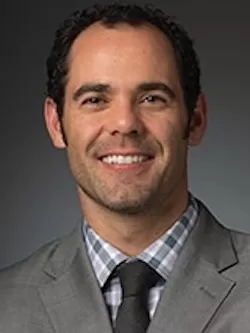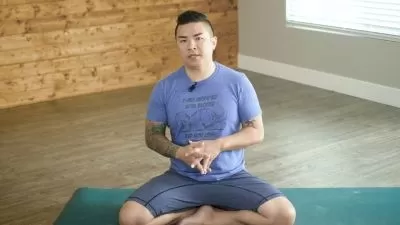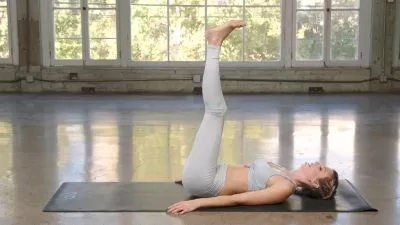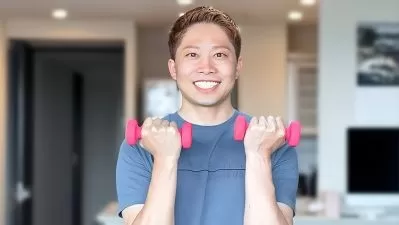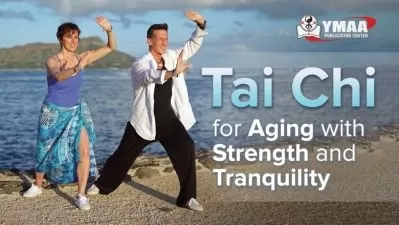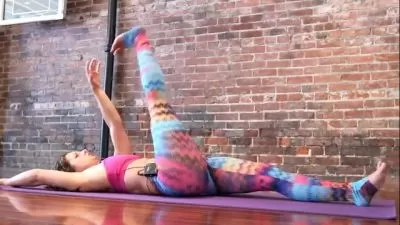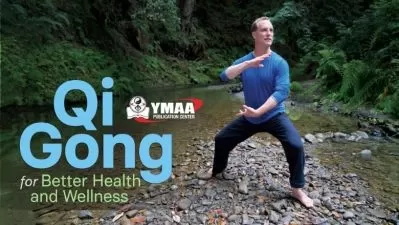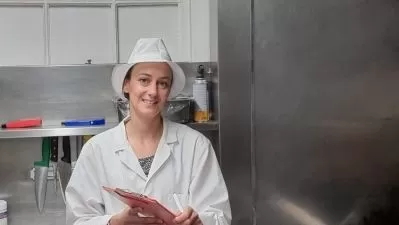Changing Body Composition through Diet and Exercise
Michael Ormsbee
12:55:51
Description
If we don’t like what we see in the mirror or if we’re struggling to walk down to the corner store, we tend to think, “Wow, I really need to lose some weight!” But the truth is you might not need to lose weight. Are you surprised? What you really need to do is lose fat and gain muscle. That change will make you look better, feel better, and perform better—whether your bathroom scale tells you any weight is lost in the process or not. In fact, if you focus on simply losing weight as your only metric, you could potentially lose both fat and muscle, becoming weaker instead of stronger. How’s that going to help you walk a mile? If you change your body composition, you’ll see and feel the results you’ve been looking for!
But how to get started? Should you avoid red meat and eat only carbs? Avoid carbs and focus on healthy fats? Will 500 crunches a day turn that belly fat into a “six pack?” Or should you stick to cardio three times a week? New diet and fitness plans come at us daily in the popular press, on the radio, and from a plethora of TV personalities hawking the latest supplement or sports drink. In the library and bookstore, shelf after shelf of books point us down conflicting paths toward health and fitness.
This course is different. Changing Body Composition through Diet and Exercise presents the latest scientific research in the field of performance nutrition. From the macro to the molecular, this solid, science-based information will help you understand your own body better than you ever have. Professor Michael Ormsbee, Associate Professor and Interim Director of the Institute of Sports Sciences and Medicine in the College of Human Sciences at Florida State University, clearly explains in 24 in-depth lectures:
- how the food you eat is broken down and distributed to the tissues in your body
- how your body uses those nutrients to produce the energy you need to function and perform
- how specific nutrition and specific types of exercises can help you lose fat, gain muscle, and feel more energetic in your daily life or on the athletic field
Dr. Ormsbee is a former collegiate athlete, and current weight-lifter and triathlete whose fascination with human physiology is absolutely contagious. His easy-going style and excitement about this cutting-edge research make the technical material engaging and easy to follow. While the course provides a complete and comprehensive look at human bioenergetics and performance nutrition, each lecture is self-contained with easily accessible material. So whether you prefer the “A-Z” big-picture view or you want to start by dipping into information about supplements and set points, Changing Body Composition through Diet and Exercise will meet your needs—and help you meet your goals.
Based on his own laboratory results and those of his colleagues, Dr. Ormsbee presents diet and exercise recommendations in incremental steps that men and women of all ages and fitness levels can follow. Each lecture ends with one specific, easy-to-implement suggestion for your consideration. No gimmicks, no quick fixes, just real science.
What Happens to the Food You Eat?
You’ve just taken that first delicious bite of a blueberry muffin and the first sip of your coffee with a friend you haven’t seen in a while. While you’re focused on the conversation, your body is hard at work digesting your food, absorbing and partitioning the nutrients, and storing the waste for later removal. You’ll learn about:
- The three categories of macronutrients—carbohydrates, fats, and protein—and the enzymes that begin to break them down into usable nutrients from that first bite
- The chemical processes occurring in the 300-square-meter surface area of your small intestine, where the greatest percentage of nutrients are absorbed, and why your body requires distinctly different enzyme groups to break down carbohydrates, fats, and proteins into glucose, fatty acids, and amino acids
- How the resulting molecules are partitioned throughout the body and ultimately affect the functionality of every microscopic process in every cell
- The ways in which your hormones such as insulin, cortisol, and catecholamines affect those processes
Which is More Important, Diet or Exercise? Now We Have an Answer
You know you need to exercise. And if you’ve been exercising for a while, you know it makes you feel good. But even if you’ve recently stepped up your exercise program, you might not be seeing the results you’ve been hoping for.
“The surprising truth is that simply exercising more and eating less is not the key for improving body composition,” Dr. Ormsbee says. “I know that’s what we’d been preaching for a long time. But it just doesn’t work all that well.”
What does work?
What works is understanding exactly how nutrients are partitioned and which type of exercise uses which source of energy in the body. You’ll learn about:
- The relationship between bioenergetics and metabolism
- The chemical processes that release stored energy to make it available for all functions of life
- Which sources of energy are used for high-intensity exercise, low-intensity exercise, and the work of maintaining our bodies while we’re at rest, e.g., breathing, regulating temperature, maintaining blood flow, etc.
- The caloric cost of exercise
- The way to best time our macronutrient intake relative to exercising for optimal performance and body composition
- Specific exercises for fat loss
- Specific exercises for increasing muscle mass
- Why exercise and food intake are critical for optimal body composition
But what about your friend who takes handfuls of vitamins, minerals, and protein supplements throughout the day? She says they’re important, but does the science back her up? What about artificial sweeteners, standing desks, or cleanse diets—are they helpful, harmful, or insignificant? You’ll learn the latest thinking on those topics and more, always based on rigorous scientific research. Equally importantly, if the research results are inconclusive, you’ll hear that, too. As Dr. Ormsbee explains, we certainly don’t have all the answers yet in this exciting new field.
Dr. Ormsbee concludes with some real-world advice for developing your individualized nutrition and exercise program and for sticking with it. What do studies tell us about the difference between those who only start a program and those who stick with it and reach their goals? The lessons presented in this course can change your life by helping you to feel better, perform better, and be healthier now and into your older years.
“Overall, the health benefits of exercise and eating right are clear,” Dr. Ormsbee says. “Think about it this way: If a pill existed that could provide even half the benefits of good nutrition and fitness, there’s no doubt it would be a best seller.”
More details
User Reviews
Rating
Michael Ormsbee
Instructor's CoursesDr. Michael Ormsbee is an Associate Professor in the Department of Nutrition, Food, and Exercise Sciences and Interim Director of the Institute of Sports Sciences and Medicine in the College of Human Sciences at Florida State University. He received his B.S. in Exercise Science from Skidmore College, his M.S. in Exercise Physiology (research emphasis in Sports Nutrition) from South Dakota State University, and his Ph.D. in Bioenergetics from East Carolina University. He is an Honorary Research Fellow at the University of KwaZulu-Natal in Durban, South Africa and a Fellow of the American College of Sports Medicine and the International Society of Sports Nutrition.
Dr. Ormsbee researches the interaction of exercise training, nutrition, and supplementation to achieve optimal body composition, human performance, and health in populations ranging from younger athletes to older adults. His work has been published in numerous scientific journals as well as consumer publications, and he has been featured as a nutrition and exercise expert on radio and TV.
Both his teaching and research have been recognized with numerous awards, including the 2013–2014 University Teaching Award, the Excellence in Online Course Design Award, the Excellence in Online Teaching Award, and the 2013 Transformation through Teaching Award. In 2015, he received the prestigious FSU Guardian of the Flame Award, granted to faculty members whose contributions have advanced FSU as a leading institution of higher education.

The Great Courses
View courses The Great Courses- language english
- Training sessions 24
- duration 12:55:51
- English subtitles has
- Release Date 2023/04/27





